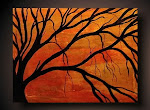Working with the Gods: Holda
Publicada por
Arith Härger
/ 5:23 PM /
Holda is a Germanic goddess with many interesting characteristics – maiden, mother, hag, spinner, stormbringer, ruler of the Wild Hunt, protector and thief of children’s souls. She was usually seen dressed in snow-white with white or silver hair, regardless of whether she appears as young and beautiful or as an old hag. In this latter form, she is said to have crooked teeth, a big nose, and one foot flatter than the other from working the spinning wheel. She wears keys at her belt, the sign of the lady of the house.
First, she is a goddess of the domestic arts – spinning, cooking, cleaning, and child care. She is a patroness of housewives, and what she values above all is industriousness. There are many legends of her rewarding diligent female workers and punishing lazy ones. She would rock cradles while exhausted mothers slept, and her preference for hard workers is reflected in the German folktale of “Frau Holle”, where a young girl falls down the well into a strange underworld. She helps every creature she meets, and willingly cleans for the old woman in her cottage, after which the old woman sends her back with a gift – a gold piece falls from her lips every time she speaks. Her mother, amazed, forces her lazy sister down the well; the sister refuses to help anyone and the old woman sends her back with a different gift – instead of gold, toads drop from her lips when she says anything.
She was especially stern when it came to women who were lazy about spinning, which was her specialty - particularly the spinning of flax. One legend has a peasant man stumbling into a cave in a mountain where Holda is seated enthroned with maidens clustered about her. She offers to give the dazed man a gift; humbly, he asks for the cluster of blue flowers in her hand. These were the flowers of flax, which according to the tale was unknown in that area at the time. Holda gave the man some flaxseeds, and eventually taught his wife to ret, scotch, break, and spin flax, thus giving us a myth about the beginning of flax culture. Holda was implacable about using her gift properly; hard workers who fell asleep over their work would awake to find their spinning done for them, while lazy women would find their spindles broken or burned.
She was also a protectress of children, although some of her myths might seem quite the opposite at first glance. It was said that Holda collected the souls of dead children, usually infants who died too soon – before being christened in Christian times, before being named in the days before that. In pre-Christian times, children were named at nine days old, and before that were believed not to be attached to the ancestral tree. If they died before that time, Holda would take them on instead of their ancestors. She also took children of other ages, for various reasons. The darker side of her myth had her stealing the lives of otherwise healthy children. She was said to travel as an old woman in a wagon, flanked by a procession of childrens’ dead souls.
Second, Holda is a goddess of Winter. She was said to bring on the first snowflakes of the year; they were referred to as Mother Holda plucking her geese, or shaking out her goose-feather pillows and comforters until the down flew. She is the White Lady during this time, the silver-haired goddess who knits the white blanket of the snow. She was also associated with other weather phenomenon –when it rained, Holda was doing her washing; lightning was her scotching the flax; the fog was the smoke from her chimney. Her association with Winter ties into her craft of fibre arts; winter was the time when people stayed inside and turned the summer’s wool and flax into clothing.
em 5:23 PM | Keywords: frau holle, Germanic goddess, Gods and Mythology, Holda, Working with the Gods





0 comentários:
Post a Comment